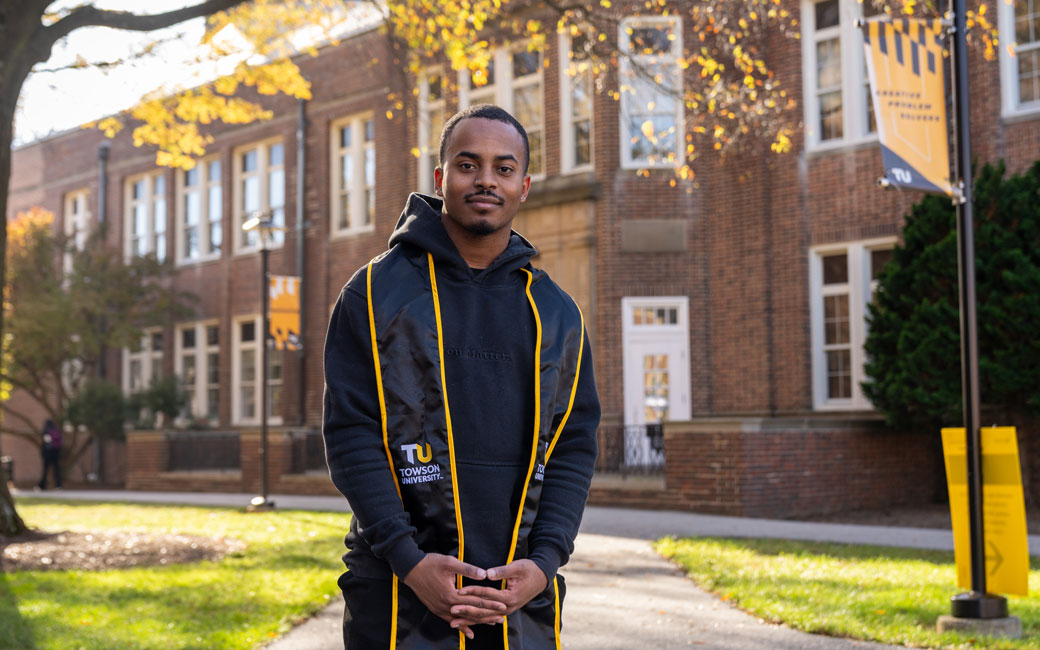One student’s path to graduating and what he learned along the way
Trevin Walker shares how a culture of support encouraged him to keep pursuing his degree.
By GRACE HOGGARTH '22 on November 30, 2023

Trevin Walker’s time at TU is illustrated by his dedication to becoming the first college-educated member of his family and the road it took him to get here.
“It’s not easy but it’s possible,” he says.
As a communication studies major with a minor in cultural studies in the College of Fine Arts and Communication, Walker found his voice in supporting others.
Walker began his studies at TU in fall 2018, and like many, was met with significant personal and academic challenges before and during the COVID-19 pandemic.
Deeply impacted by the illnesses and deaths of people close to him during his college career, Walker puts an emphasis on taking life day by day. “It’s not so much about the destination for me, but more about the journey,” he says.
Looking back on his academic career at TU, Walker feels satisfied with how far he’s come. He found comfort in taking risks that opened new pathways for him academically and personally.
One impactful part of his journey at TU is his involvement in the TU Debate team and the opportunities that have arisen from it.
Walker got involved with the team through a mock debate in one of his courses with Professor Michael Harrington. After debating topics in class, Harrington encouraged Walker to give the team a try.
In close collaboration with Harrington, Walker has since begun an independent study titled Black Sonic Performativity through which they have researched rhetorical theories around Blackness, performance and sonics. The two used these different scopes of research to craft performances that implicate Black livelihood and resistance to dominant ideals.
Through Walker’s independent study, he contributed to TU’s annual Black Student Leadership Conference, hosted by TU’s Center for Student Diversity. This year’s theme, Black Resistance, focused on how students can and have survived, advanced and thrived as leaders of organizations on TU’s campus. Walker and Harrington participated in a community table to discuss issues pertinent to the Black community and performed a spoken word on Black care.
As a first-generation college student, Walker had the challenge of learning how to set himself up for success with little background knowledge of how to navigate the higher education atmosphere.
“It would've been a lot easier for me to quit than to keep going,” he says.
That’s especially true when navigating personal losses and academic challenges throughout the pandemic. However, Walker kept pushing forward with the support of family, friends and professors.
He credits much of his campus involvement, academic achievements, confidence and drive to the professors who pushed him to succeed. In addition to Harrington, Walker valued the support of Professor Ray Baker, Dr. Michael Tristano, Professor Cicada Inscoe, Professor Kiara Anthony, Dr. Cole Reilly and Professor Sara Harrison.
“My professors let me know that if I needed help or encouragement–or quite frankly a second chance–then they were there for me,” he says.
Communication studies is one of the many paths of study available in COFAC, and Harrington wholeheartedly supports its academic excellence and endeavors to support student goals. “There’s so much value and richness that comes from our department! Students learn several different forms of communicative focuses that suit their particular needs— interpersonal, organizational, cultural and rhetorical,” he says.
The communication studies department has one of the most diverse faculty member cohorts at TU. “The reason our department is so wonderful and can cater to many students is because of the diverse nature of our faculty,” Harrington shares. “Any possible theory, praxis, research, method, one can think of or is interested in, our department has someone who can help facilitate that. Our department is truly dedicated to enriching students with knowledge to gear better leaders for tomorrow.” he adds.
Opportunities like the debate team and the Black Student Leadership Conference encouraged Walker to think critically about issues of concern to him and how to be an effective communicator when discussing critical topics from multiple points of view.
Walker also found comfort and community in Brotherhood, a student organization established on TU’s campus in 1981 for Black male students to create a family-like support system to help each other with the challenges of being minority men on a predominately white campus.
“There were so many times that I wanted to give up, where graduating didn’t feel real to me,” he says. “Now I’m finishing up my classes and getting ready to cross the stage.”
Courses that offered him different avenues of thinking include African American communication, non-verbal communication and intercultural communication.
“ I’ve been told my entire life, ‘Trevin you can’t save the world,’ and my answer has always been, ‘Yeah, I can’t, but I’m gonna try anyway.’ ”
Walker’s studies in COFAC have geared him toward interests in diversity, equity and inclusion. He hopes to pursue a life path that enables him to motivate people and bolster their confidence. He aspires to one day have his own scholarship that will support students with financial and academic challenges in achieving their academic goals.
Walker embraces the journey and time it took to achieve his degree and what it symbolizes for his family. After he crosses the stage in a few weeks, Walker says he hopes to serve as the representation he didn’t see as a child and to show younger generations that they can do it too.